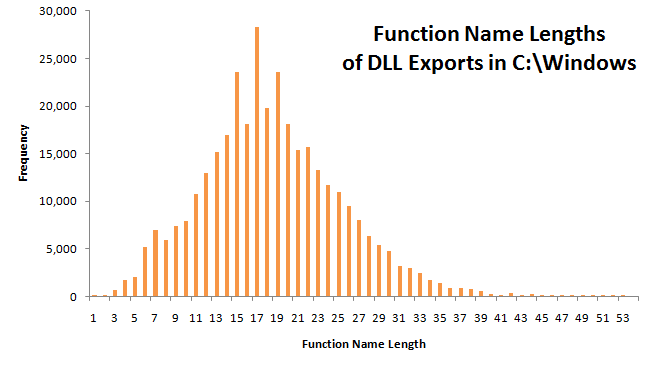RtlWriteDecodedUcsDataIntoSmartLBlobUcsWritingContext and Other Long Function Names
I find long functions names charming – I think they impart a certain personality to the API and add to the fun of programming. And while I try to avoid excessively long names in my own code at work (unless they add to clarity), I never fail to get a good kick seeing such names used by other programmers!
Every reader should ask himself periodically “Toward what end, toward what end?” – but do not ask it too often lest you pass up the fun of programming for the constipation of bittersweet philosophy. – Alan J. Perlis foreword to SICP
I’ve often wondered what the longest names would look like. So I decided to explore a large system – the system DLLs in C:\Windows directory – and dig up some of the biggies. My plan was to write a script that walked through the installed DLLs and looked at their exported functions list for interesting candidates.
The Winners
Here are the longer ones I could find:
- RtlWriteDecodedUcsDataIntoSmartLBlobUcsWritingContext [wcp.dll], with 53-characters, was the longest one (but this function is not documented)
- (52) ConvertSecurityDescriptorToStringSecurityDescriptor{A,W} [advapi32.dll], the function that Raymond Chen admitted was the reason for his post on security descriptors .
- (52) ConvertStringSecurityDescriptorToSecurityDescriptor{A,W} [advapi32.dll], the complement of the above.
- (50) CreatePrivateObjectSecurityWithMultipleInheritance [advapi32.dll], another security function.
- (50) CertCreateCTLEntryFromCertificateContextProperties [crypt32.dll].
- (50) EapHostPeerQueryUIBlobFromInteractiveUIInputFields [eappcfg.dll].
- (49) AccessCheckByTypeResultListAndAuditAlarmByHandle{A,W} [advapi32.dll], yet another security API – I guess the security API programmers get a good kick from long names, just like me!
- (47) GetNumberOfPhysicalMonitorsFromIDirect3DDevice9 [Dxva2.lib].
- (43) SetupRemoveInstallSectionFromDiskSpaceList{A,W} [Setupapi.dll]. And just so that no one thinks I’m making these up, I’ve linked to their documentation!
Curious on seeing these names, I dug through the other “operating system” I had access to — GNU EMACS. The longest interactive command there is slime-compiler-notes-default-action-or-show-details/mouse: Counting punctuations, this beats the longest Windows export by 4 characters.
The Method
I used the pefile Python library to parse all DLLs in my windows directory. I only considered “system” DLLs (ignoring any third-party drivers etc.) by checking for “Microsoft” in the DLL copyright-string. In addition, I discarded any C++-ish exports, because the C++ name-mangling skewed the results too much and I was too lazy to hook in a “undecoratify” procedure.
Finally, on my 64-bit windows installation, there are both 32-bit and 64-bit versions of many core DLLs (in System32 and SysWOW64 directories respectively), and I encountered duplicates. A similar thing happened with SxS DLLs.
Using this Python script I coded, I generated a delimitered text-file with around 1500 entries that I manually scanned (I had some time to waste!) for “interesting” names. Below is a histogram of the function-name lengths. The rough bell shape gives me confidence that script wasn’t totally off the mark.

Functions Taking Lots of Parameters
A second axis to dig “interesting” functions would be to count the number of function params.
This one is a bit of fuzzy due to questions like “Do you count /deep/“? That is, when a function accepts a pointer to a struct, do you count the struct members as inputs too? For instance, CreateFontIndirectEx [gdi32.dll] takes a pointer to ENUMLOGFONTEXDV structure that holds about two dozen items (all things considered).
Counting params is also more work, at least for DLL exports (where you need to cross-reference with documentation/headers if the export is, at all, public). Otherwise, the problem can be approached differently by forgetting DLL exports entirely and instead using a crawler that walks the the locally installed MSDN and parses the “Syntax” section to count the number of params — just assuming num_params = num_commas + 1 might be good enough.
Anyway, manually browsing through some of MSDN, I chanced upon a few gems:
- AccessCheckByTypeResultListAndAuditAlarmByHandle, our friend from above, true to its character, takes 17 parameters!
- OleCreateFromFileEx takes in a filename, interface ID, flags, sink, connection, site, … 13 in all.
On a Serious Note
Well named functions (just like well named variables) are good instant documentation. Descriptive function are important when:
- Such functions all belong to a flat namespace (DLL exports or C code)
- Several of them have very similar purpose (like the six or so AccessCheck* APIs) Such names become even more relevant when they define the public API of your library/system.
Some people (“constipated by bittersweet philosophy”?) dislike long function names, and I wonder why. The argument that longer functions take longer to type seems mostly dud: Visual Studio with the awesome Visual Assist X addon does Intellisense beautifully; Emacs with hippie-expand does some good magic. So typing isn’t a problem.
Links
While researching for this entry, I came across the Brad Abrams’s “Best” method names ever that has some interesting ones.